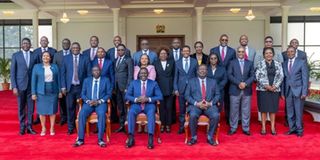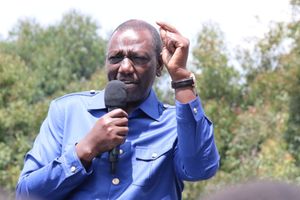
President William Ruto with members of his cabinet at State House, Nairobi.
When President Ruto selected his disgraced Cabinet, which collectively boasted a wealth of Sh15 billion, few questioned the origins of this fortune. We neglected to ask what industries these individuals were involved in or what investments had yielded such significant returns.
To this day, we remain unaware of the President’s net worth. Given the adage that a fish rots from the head, we cannot simply accept his self-proclaimed “hustler” persona without scrutiny.
As Ruto tackles the self-inflicted mess, I have to remind him of an epic quote from Ewart Grogan, the founder of Chiromo, directed at a new colonial governor: “This country is not willing to be governed by secretariat officers, men of little more brains than the creatures that crawl at the bottom of the sea…we want people with vision that extends beyond the end of their noses.” As he picks his new Cabinet after the spectacular failure of the last, he now knows that the Gen Z will watch the records of the appointees from close quarters. “A new sheriff”, as Richard Onyonka, recently observed, “is in town”.
The Gen Z know the truth: The “hustler” narrative was a deception crafted by the political elite to manipulate voters. These elites, a class of millionaires and billionaires who thrived on patronage and clientelism, promised jobs and development projects to poorer communities to secure votes. Their promises of social programs targeting the poor were nothing but a ruse. Finally, the chicken has come home to roost.
In the 1970s, populist Nyandarua MP JM Kariuki warned that Kenya risked becoming a country of 10 millionaires and 10 million beggars. By 2000, former Meru Governor Kiraitu Murungi observed, “We are now in a society with 10 billionaires and 30 million beggars!” Earlier, Mwalimu Julius Nyerere of Tanzania cautioned against aspiring to be like Kenya’s “man-eat-man society.”
Crime scenes
Where did the rains start to beat us? Many Kenyans do believe that the Ndegwa Report made all the difference. Allowing politicians and civil servants to do business with the government turned ministries into crime scenes. Today, we see billboards proclaiming these areas as corruption-free zones, yet every year, no government institution escapes negative scrutiny by the auditor general. Strangely, corruption is not the crime that fills our jails. Instead, it fills our Parliament!
In the 1970s, the political elite engaged in poaching, gemstone dealing, car trading, and smuggling coffee and cloves. Despite modest salaries, some MPs and civil servants amassed significant wealth, which is now often portrayed as the result of hard work. What a lie! However, the reality of the 1960s and 70s reveals an elite that embraced the settler culture of wealth accumulation, becoming agents of neocolonialism.
Corruption was institutionalised with the adoption of the Ndegwa Report, allowing civil servants and the political elite to form companies and trade with the government. This led to the creation of companies like African Liaison and Consulting, Heri Limited, and many others that brought together prominent figures such as Ben Gethi, Bruce Mackenzie, Julius Gecau, James Kanyotu, Daniel arap Moi, Charles Njonjo, Mwai Kibaki, Philip Ndegwa, and Dr. Njoroge Mungai among others.
From then on, wealth and exploitation of the masses were normalised. Calls against such opulence came from figures like Elijah Mwangale, who sought a law limiting land ownership to 10,000 acres, and Charles Rubia, who attacked the culture of “land grabbing.” However, these calls often went unheeded – and soon, the champions were also compromised. Over the years, the wealthy elite presented themselves as champions of development for poor communities.
These “development-conscious leaders” were immensely wealthy and – and the immensely wealthy were deeply corrupted, and the deeply corrupted became politicians. People like Paul Ngei would order luxury cars and refuse to pay, passing the bill to the State. Politics, we were told, is a dirty game – rather than the game of the dirty.
This did not change with the death of Jomo Kenyatta. Under Moi, the Tugen Mafia emerged to replace the Mt Kenya Mafia, controlling the center of power and amassing great wealth. Figures like Joshua Kulei, Abraham Kiptanui, and Mark Too became directors of companies in which Moi had an interest. They congregated in a church within Kabarak High School, displaying their wealth through the Harambee spirit, which validated their embezzlement of taxpayer money.
“It is our time to eat” justified corruption and the new elites in town.
The Mwai Kibaki regime, elected on an anti-corruption agenda, also failed to stop the culture of corruption. The Anglo-Leasing and Artur Magaryan scandals tarnished what could have been a clean presidency, as the political elite continued to grab as much as they could.
Today, Kenya has become a nation of money worshippers, where churches have been transformed into unholy citadels thanks to politicians. The Church played a central role in the election of President William Ruto, as congregants mistook validation of unexplained wealth for philanthropy and devotion.
Recent events within the Ruto presidency should prompt a re-evaluation of the Ndegwa Report. Although President Uhuru Kenyatta attempted to address this issue, he failed to establish a framework to strengthen Chapter Six of our Constitution. Instead, he allowed his ministers and parastatal heads to embezzle under his watch, continuing the “It’s our Time to Eat” culture. He too will never escape blame.
For more than 60 years, the political class has insulted our intelligence, stolen our children’s future, and mismanaged the country as we watched. The next crucial conversation Kenya needs is about integrity and wealth. This conversation has been ongoing since Jomo Kenyatta’s time when senior Cabinet ministers started grabbing settlement schemes and writing off loans. We have a president who has a hotel sitting in what is clearly public land.
Where do we go from here? The Ndegwa Report has become a license for public sector exploitation. It has created overnight millionaires and attracted politicians with little more brains than sea creatures, as Richard Onyonka recently noted.
Onyonka’s recent address to his fellow MPs was painful and to the point: “Why do we behave like monkeys?” he asked. “The people are getting tired. We are messing up a good country. There is enough to eat for all of us if you eat with good manners. A few people are stealing too much. Why must someone have 4 million acres? We pretend, steal, and run to churches…who doesn’t know about the Governors who own apartments in Kilimani Road costing Sh1.5 billion…and we think that is ok! Why didn’t the fool build a hospital where he comes from?” If you have time, listen to Richard Onyonka. His message is clear: We must wake up and correct the wrongs in our society. We must stop the political class from continuing their exploitation. They no longer own this space called Kenya. But first, let us revisit the Ndegwa Report.











